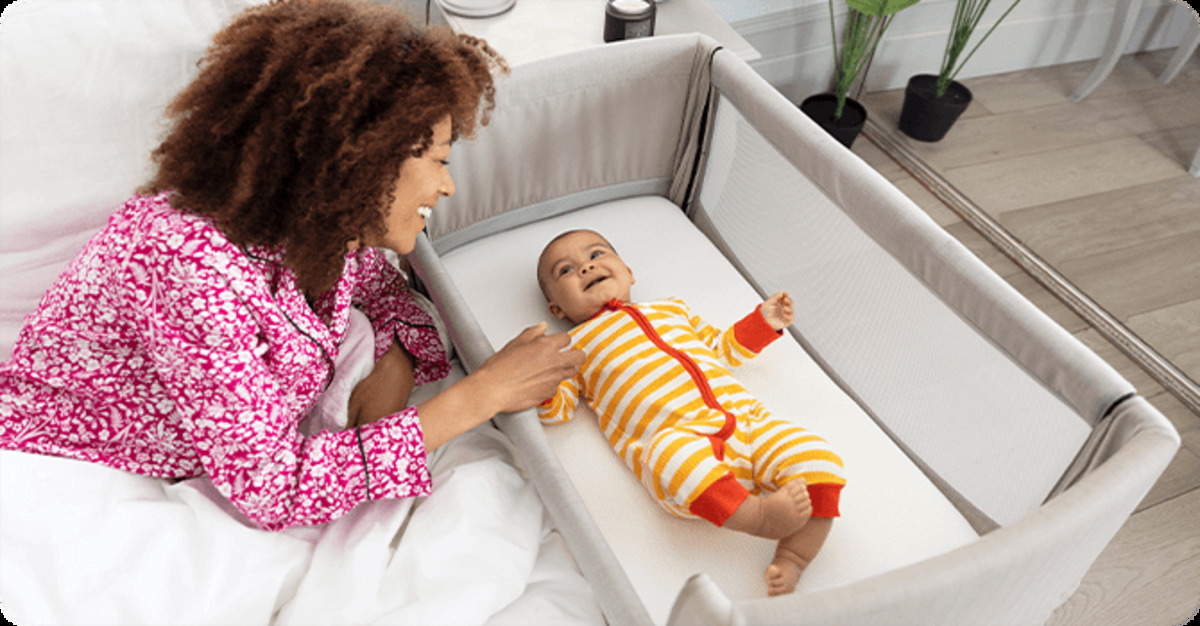
Midwives and doctors usually advise new parents to keep their baby in the same room as them for the first few months after birth. According to the American Academy of Pediatrics (AAP), this practice reduces the risk of Sudden Infant Death Syndrome (SIDS) by up to 50 percent. However, some parents wonder how long they should room-in with their baby. Could it be a year? Six months? Perhaps three? In this blog post, we’ll explore this topic in-depth, so you can make a well-informed decision for you and your baby. Within the blog we talk about room sharing but to be clear co-sleeping is absolutely not recommended your baby should always be placed on their back in their own crib or cot.
The AAP recommends that babies sleep in their parent’s room for at least the first six months and, if possible, up to one year. Room-sharing helps reduce the risk of SIDS, but it appears that the benefits are particularly significant during the first six months. It’s worth mentioning that studies have shown that the risk of SIDS is highest during the first few weeks of life, so it’s particularly important to keep your baby close during this time.
Although there isn’t an exact timeframe for how long you should keep your baby in your room, it’s essential to have their safety as your top priority. Experts recommend that you share your room with your baby until they’re no longer at risk of SIDS, which is usually around six months. You can, however, continue to enjoy room-sharing for longer if you think it’s right for you and your family.
Some parents decide to extend the time frame beyond the recommended six-month period, while others decide to move their baby into their own room after just a few weeks. It all comes down to how you feel as a parent and what works for you and your baby. It’s essential to keep in mind that every family is different, and there’s no one-size-fits-all approach to parenting.
Besides your personal preference, there are several other factors that can influence your decision about how long to room-in with your baby. For instance, if your baby has a medical condition or if you’re breastfeeding, you may want to sleep in the same room for longer. On the other hand, if your baby has a loud cry, you might prefer to move them to their room earlier, so that everyone can sleep better.
When you’re ready to move your baby to their own room, you can do so gradually. Spend time with them in their room during the day, and let them get used to the environment. You could also sleep in their room for a night or two before making the move permanently. Remember that your baby has been used to your presence, warmth, and voice, so moving them to a new environment can be a daunting experience. Be patient and supportive, and soon enough, they’ll adapt to their new sleeping arrangements.
Rooming-in with your baby is a personal decision that depends on your individual circumstances and preferences.
The information found anywhere on this website, including but not limited to text, graphics, images and any other material therewith is for information purposes only. No material on this website is intended to be a substitute for professional personalised medical advice, diagnosis or treatment. By providing the information contained herein we are not diagnosing, treating, curing, mitigating or preventing any type of disease or medical condition. Always seek the advice from a registered health care professional if you have any questions regarding any medical concerns or conditions. Do not disregard professional medical advice or delay in seeking it because of something you have read on this website.
This website is not meant to be self-treating but is a supplement to the care given by competent medical health professionals. Hegenberger Medical take no responsibility for any damage suffered by any woman or baby. Our opinions are our own and do not replace advice from competent medical health professionals. The material on this site may not be reproduced, distributed, transmitted, cached, or otherwise used, except with the prior written permission of Hegenberger Medical.
